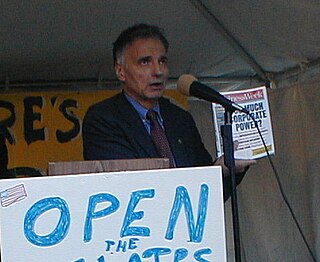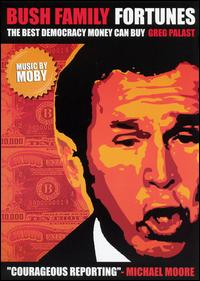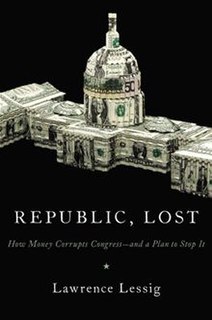
Ralph Nader is an American political activist, author, lecturer, and attorney noted for his involvement in consumer protection, environmentalism, and government reform causes.

The 2000 United States presidential election was the 54th quadrennial presidential election, held on Tuesday, November 7, 2000. Republican candidate George W. Bush, the governor of Texas and eldest son of the 41st president, George H. W. Bush, won the election, defeating incumbent Vice President Al Gore. It was the fourth of five American presidential elections, and the first in 112 years, in which the winning candidate lost the popular vote, and is considered one of the closest elections in US history, with longstanding controversy surrounding the ultimate results.
Campaign finance laws in the United States have been a contentious political issue since the early days of the union. The Bipartisan Campaign Reform Act (BCRA) of 2002, also known as "McCain-Feingold", is the most recent major federal law affecting campaign finance, the key provisions of which prohibited unregulated contributions to national political parties and limited the use of corporate and union money to fund ads discussing political issues within 60 days of a general election or 30 days of a primary election, until BCRA's provisions limiting corporate and union expenditures for issue advertising were overturned in Federal Election Commission v. Wisconsin Right to Life.

Political corruption or Malpolitics is the use of powers by government officials or their network contacts for illegitimate private gain.
Transparency International e.V. (TI) is a German registered voluntary association (Eingetragener Verein) founded in 1993 by former employees of the World Bank. Based in Berlin, its nonprofit and non-governmental purpose is to take action to combat global corruption with civil societal anti-corruption measures and to prevent criminal activities arising from corruption. Its most notable publications include the Global Corruption Barometer and the Corruption Perceptions Index. Transparency International serves as an umbrella organization. From 1993 till today its members have grown from a few individuals to more than 100 national chapters which engage in fighting perceived corruption in their home countries. TI is a member of G20 Think Tanks, UNESCO Consultative Status, United Nations Global Compact, Sustainable Development Solutions Network and shares the goals of peace, justice, strong institutions and partnerships of the United Nations Sustainable Development Group (UNSDG). TI confirmed the dis-accreditation of the national chapter of United States of America in 2017.
Accountability, in terms of ethics and governance, is equated with answerability, blameworthiness, liability, and the expectation of account-giving. As in an aspect of governance, it has been central to discussions related to problems in the public sector, nonprofit and private (corporate) and individual contexts. In leadership roles, accountability is the acknowledgment and assumption of responsibility for actions, products, decisions, and policies including the administration, governance, and implementation within the scope of the role or employment position and encompassing the obligation to report, explain and be answerable for resulting consequences.

Gregory Allyn Palast is an author and a freelance journalist who often worked for the BBC and The Guardian. His work frequently focuses on corporate malfeasance but he has also worked with labour unions and consumer advocacy groups.
Jacob "Jake" Horton was a senior vice-president of Southern Company's Gulf Power Unit, killed when a corporate airplane caught fire and crashed, shortly after takeoff from Pensacola, Florida. Journalist Greg Palast has alleged that Horton was murdered, by the corporation, in order to prevent him from accusing the board of directors of making illegal payments to politicians (1 -- p. 109).

James Allen Hightower is an American syndicated columnist, progressive political activist, and author. From 1983 to 1991 he served as the elected commissioner of the Texas Department of Agriculture.
The Florida election recount of 2000 was a period of vote recounting in Florida that occurred during the weeks after Election Day in the 2000 United States presidential election between George W. Bush and Al Gore. The Florida vote was ultimately settled in Bush's favor by a margin of 537 votes when the U.S. Supreme Court, in Bush v. Gore, stopped a recount that had been initiated upon a ruling by the Florida Supreme Court.

Campaign finance, also known as election finance or political donations, refers to the funds raised to promote candidates, political parties, or policy initiatives and referenda. Political parties, charitable organizations, and political action committees are vehicles used for fundraising for political purposes. "Political finance" is also popular terminology, and is used internationally for its comprehensiveness. Political donations can also refer to funds received by political parties from private sources for general administrative purposes.
Forms of electoral fraud, sometimes referred to as election manipulation, voter fraud or vote rigging, involves illegal interference with the process of an election, either by increasing the vote share of a favored candidate, depressing the vote share of rival candidates, or both. It differs from but often goes hand-in-hand with voter suppression. What exactly constitutes electoral fraud varies from country to country.

The Bipartisan Campaign Reform Act of 2002 is a United States federal law that amended the Federal Election Campaign Act of 1971, which regulates the financing of political campaigns. Its chief sponsors were senators Russ Feingold (D-WI) and John McCain (R-AZ). The law became effective on 6 November 2002, and the new legal limits became effective on January 1, 2003.

The Florida Central Voter File was an internal list of legally eligible voters used by the US Florida Department of State Division of Elections to monitor the official voter lists maintained by the 67 county governments in the State of Florida between 1998 and January 1, 2006. The exclusion of eligible voters from the file was a central part of the controversy surrounding the US presidential elections in 2000, which hinged on results in Florida. The 'Florida Central Voter File' was replaced by the Florida Voter Registration System on January 1, 2006, when a new federal law, the Help America Vote Act, came into effect.

The 2000 presidential campaign of Ralph Nader, political activist, author, lecturer and attorney, began on February 21, 2000. He cited "a crisis of democracy" as motivation to run. He ran in the 2000 United States presidential election as the nominee of the Green Party. He was also nominated by the Vermont Progressive Party and the United Citizens Party of South Carolina. The campaign marked Nader's second presidential bid as the Green nominee, and his third overall, having run as a write-in campaign in 1992 and a passive campaign on the Green ballot line in 1996.

Bush Family Fortunes: The Best Democracy Money Can Buy is a 2004 documentary film directed by Steven Grandison and Greg Palast. The film, which examines various aspects of the Presidency of George W. Bush, including the 2000 US Presidential election and the Iraq War, is adapted from the 2003 BBC production Bush Family Fortunes and based on the 2002 book The Best Democracy Money Can Buy by investigative journalist Palast, who had spent years tracking the Bush family for the BBC and The Guardian newspaper. The research for the original BBC film, which claims to have exposed the George W. Bush military service controversy, was also drawn upon by Michael Moore for Fahrenheit 9/11 (2004) and footage was used by Robert Greenwald in Unprecedented: The 2000 Presidential Election (2002).

Meirion Jones is a Welsh journalist. He worked for the BBC until 2015. In July 2016 he became Investigations Editor at the Bureau of Investigative Journalism.

Republic, Lost: How Money Corrupts Congress—and a Plan to Stop It is the sixth book by Harvard law professor and free culture activist Lawrence Lessig. In a departure from the topics of his previous books, Republic, Lost outlines what Lessig considers to be the systemic corrupting influence of special-interest money on American politics, and only mentions copyright and other free culture topics briefly, as examples. He argued that the Congress in 2011 spent the first quarter debating debit-card fees while ignoring what he sees as more pressing issues, including health care reform or global warming or the deficit. Lessig has been described in The New York Times as an "original and dynamic legal scholar."

Robert Fitrakis is an American lawyer, political author, political candidate, and Professor of Political Science in the Social and Behavioral Sciences Department at Columbus State Community College. He has been the editor of the Columbus Free Press since 1993 and wrote extensively about the 2004 U.S. presidential election and related 2004 U.S. election voting controversies. Fitrakis is a Green Party activist.
RepresentUs is a nonprofit organization founded in November 2012 that advocates for state and local laws based on model legislation called the American Anti-Corruption Act. It is a proposal to overhaul lobbying, transparency, and campaign finance laws. RepresentUs is headquartered in Florence, Massachusetts and is supported by a national network of volunteer-led chapters.













